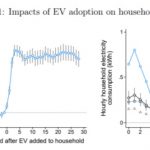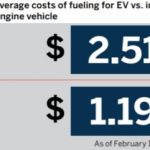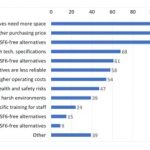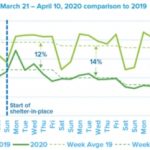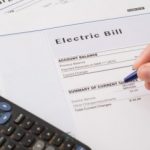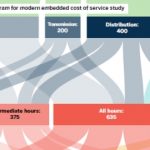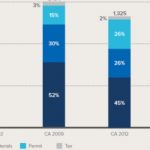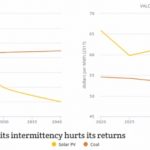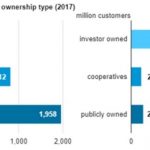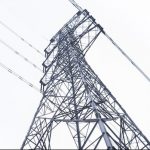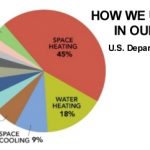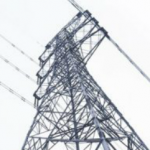Research from California, the EV leader in the U.S., suggests that EV owners drive their vehicles half as much as the average gasoline car owner. Catherine Wolfram at the Haas School of Business explains that their research project reveals mileage data is so hard to gather that it’s difficult to know what’s actually going on. Is the data wrong (they don’t think so), or are EVs only being bought by drivers who don't use a car much? If so, the … [Read more...]
The Road Transport Transition: a policy toolkit for electrification
For the electrification of road transport, planning, incentives, the removal of barriers, and the right regulatory framework are all needed. But different regions with different rural and urban lifestyles will each need their own solution. Camille Kadoch at RAP summarises their RAP EV Roadmap for the U.S. which provides a toolkit for assembling your unique solution. It includes targets, funding sources, policy coordination, incentives (including … [Read more...]
How ready is the switchgear industry to abandon SF₆, the worst greenhouse gas?
Are firms in the switchgear industry - power utilities, industrial sites, and related service and infrastructure sectors - happy to switch from using the gas SF6 and use alternatives that are less harmful to the climate? This is the question Marie-Charlotte Guetlein and Carine Sebi at the Grenoble École de Management asked over 400 switchgear customers to find out what’s needed to make the change. SF6 has 23,500 times the impact of CO2 and an … [Read more...]
Dutch-Spanish startup navigates coronavirus fallout while also guiding utilities into the digital age
In late summer 2015 at a research university in Belgium, an Italian graduate student new to campus attended a welcome event hosted by engineering department faculty. Sampling beer brewed by an electrical engineering student association, Simone Accornero mingled with a dozen other new classmates in his program at KU Leuven. Accornero began chatting with an engineering master’s student who had just arrived from Poland. “We hit it off,” Accornero … [Read more...]
Sales down, but cash preserved too: Regulators take note when setting new Utility rates
Utilities are suffering financial impacts because of the current pandemic, and regulators will be asked to address them when they set new electricity rates. The intention will be to help the utilities recover while keeping bills affordable for their customers. But not all the impacts on the utilities are bad news, explains Jim Lazar at RAP looking at the U.S. Though revenues have dropped and some labour costs risen, there is a list of things that … [Read more...]
Utilities can help their central banks, “loaning” electricity during the slump
The coronavirus slump is forcing governments around the world to inject large amounts of cash into the hands of consumers and businesses, until this is all over. In the U.S. it’s $2tn. Catherine Wolfram at the Haas School of Business suggests a way to cut that bill, easing the pressure on central bankers. Utilities (electricity, water, gas) should allow customers to defer payment (instead of using valuable bailout money to pay the utilities). The … [Read more...]
Electric utilities: pathway to a costs and pricing revolution
The 20th century method of setting electric utility rates are being made redundant by the new technologies of the modern age. It’s currently a three-step process - determining the revenue requirement, deciding how to divide costs among ratepayers, then designing the rates themselves. It uses traditional categories: generation, transmission and distribution; cost classifications (energy-related, demand-related, customer-related); customer/rate … [Read more...]
EV Charging Infrastructure: “hidden” soft costs are slowing take up
You don’t buy an EV if you’ve nowhere to charge it. So the take up of EVs depends on the availability – and therefore the costs - of charging infrastructure. Rocky Mountain Institute’s Chris Nelder describes the surprising conclusion of their recent report “Reducing EV Charging Infrastructure Costs”, that it’s the soft costs that are stubbornly refusing to go down in the U.S. That means things like permitting delays, complex utility … [Read more...]
The Six Energy Paradoxes that slow the sector’s progress
Gerard Reid at Alexa Capital takes a high level look at what he sees as six systemic problems faced throughout the energy sector. They can be found at every level, across all technologies and markets. He calls them the Six Energy Paradoxes. All of them are acting as a serious drag on progress, Transition or not. Take the Market Efficiency Paradox. Utilities should adjust their prices to meet changes in energy supply and demand. Higher supply or … [Read more...]
California fires and blackouts: would non-profit utilities be more reliable, safer, cheaper?
The wildfires in California ignited by poorly maintained transmission lines have themselves ignited a debate about whether the guilty - and now bankrupt - energy utility PG&E (the largest in the state) should now become publicly owned. That in turn has led Severin Borenstein at the Energy Institute at Haas to consider the pros and cons of public v private in this vital activity. The first thing to note is that electricity transmission and … [Read more...]
Fieldfisher Interconnectors Forum – Brussels, 21 March 2019
The Fieldfisher Interconnector Forum will take a highly topical look at Interconnectors across Europe and the UK. This free half day event will cover significant legal developments and hot topics, including: The Outlook for Interconnectors - Future Opportunities Brexit and Future Energy Trading Scenarios Energy Market and Regulation Updates Environmental and Planning Perspectives Attendees will hear from Will Bridges, … [Read more...]
U.S. innovative financing makes buildings energy efficiency affordable even to poor communities
Buildings energy efficiency is not moving fast enough to meet the Paris Agreement goals. Retrofitting old buildings is extremely costly and needs much more investment, as our previous articles have detailed. Innovative models of financing are urgently needed. In an article for Ensia, Nate Berg explains how by rolling upgrade costs into monthly bills for poorer communities, U.S. utilities are helping customers save energy and money at the same … [Read more...]
Utilities are starting to invest in big batteries instead of building new power plants
There has been a dramatic drop in battery costs in recent years. Jeremiah Johnson and Joseph F. DeCarolis, of North Carolina State University, say if this continues grid-scale batteries could supplant the usual solutions to peak electricity demand: gas power plants and transmission lines. Inevitably, this will depend on the future price of gas, and the changing policy environment. But one thing is for sure: utilities don’t want to invest in peak … [Read more...]
Does the U.S. really need new gas infrastructure?
Gas prices within the U.S. vary considerably, largely due to poor local gas infrastructure: Boston’s gas prices can be triple New York’s, and Los Angeles’ over 50% higher than San Francisco’s. Should the U.S. spend billions upgrading that infrastructure? Not if money spent on assets that may one day be stranded is money wasted. Andrew Campbell, Executive Director of the Energy Institute at Haas at the University of California, says the best … [Read more...]
EU energy sector set for crucial state aid decisions in 2019
2018 was a watershed year for state aid regulations in the EU energy sector. A number of landmark rulings by the European Commission towards different member states have challenged the legality of various state aid measures and prompted governments to reconsider mechanisms for supporting domestic energy sectors. In particular, early-stage capacity mechanism procedures for many member states have been scrutinised, albeit favourably, and … [Read more...]


